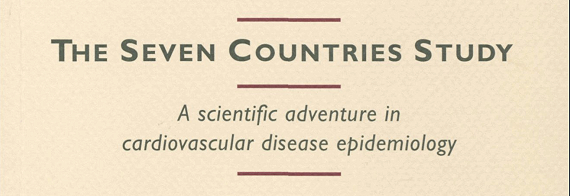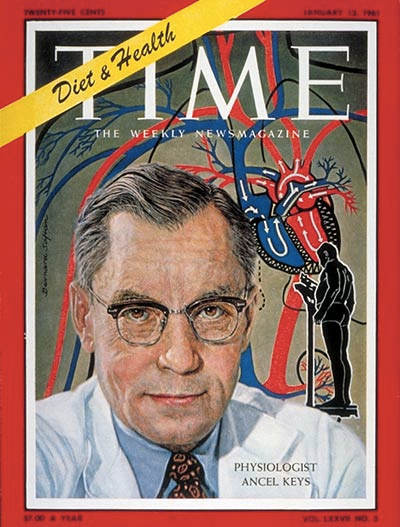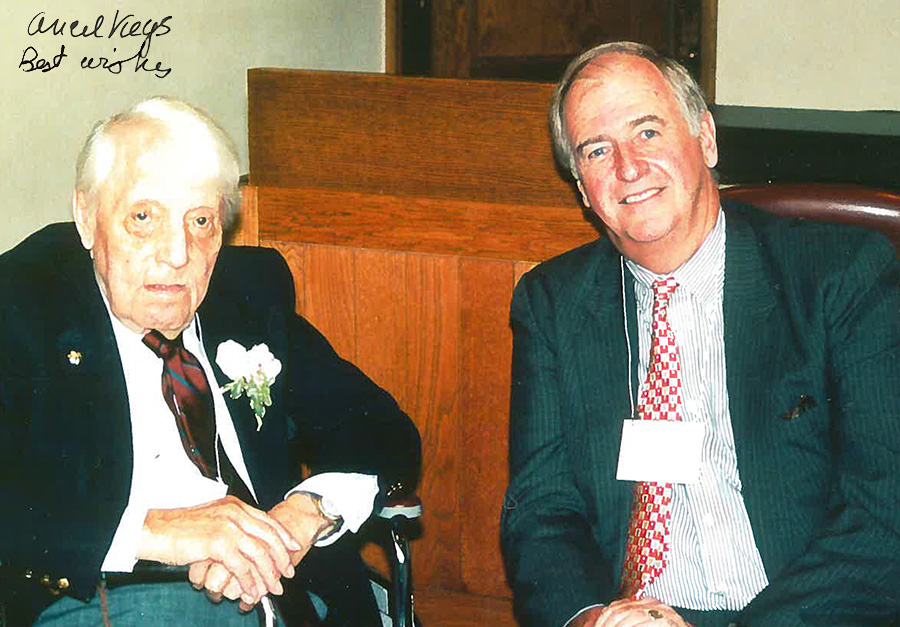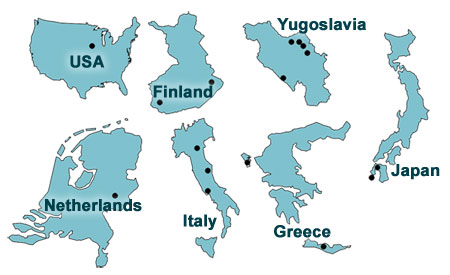On January 13, 1961, Americans opened their mailboxes to see the bespectacled face of Ancel Keys on the cover of Time magazine a spot usually reserved for politicians, film stars, or top athletes. What on earth had a physiologist done to compete for that exalted space
For starters, Keys was already known and respected for his role in developing the military meals dubbed K-Rations in honor of Keys that fed many GIs in World War II. Toward the end of that war, he carried out the Minnesota Starvation Experiment, to determine the best way to safely and gradually refeed starving refugees. Now, in peacetime, Time was highlighting Keys new mission: to figure out what was causing heart disease rates to skyrocket. Heart disease had in fact plummeted during the war, when certain foods were unavailable, so Keys suspected there was a relationship between diet and heart health.
(Well, DUH, we hear you saying. Of course what you eat affects heart health, and health in general. The link may seem evident to us today, but 60 years ago it wasn’t a given.)
To learn more about the links between heart disease and health, Keys envisioned an enormous world-wide study, gathering data on foods eaten and on rates of heart disease in as many countries as possible. His efforts, which became known as the Seven Countries Study, collected data on 12,763 men, with follow-ups at five, ten, and fifteen years, and showed a strong correlation between saturated fat and heart disease.
Keys championed the Mediterranean Diet (high in unsaturated fats and full of legumes, whole grains, fruits, vegetables, and nuts) and, following his own dietary and lifestyle advice, spent much of his last three decades in the Italian region of Campania, south of Naples; he lived until just short of his 101st birthday. For decades, the Seven Countries Study was hailed as ground-breaking and cited as the foundation and inspiration for subsequent dietary research.
Ancel Keys Battles Alternative Facts
Fast forward to recent times, with headlines announcing Butter is Back (even if the evidence says otherwise, as we wrote in a recent blog). Ancel Keys has been thrown under the bus by a clamoring crowd who claim his work led to the low-fat diets that had Americans living on SnackWell’s, soda, and white bread. Nothing could be further from the truth; Keys promoted quality carbs, fats, and protein all around long before this became fashionable.
Now a new White Paper from the True Health Initiative published today has come to Keys rescue with a strong, documented defense including these summary words:
Misadventures in low-fat eating, to say nothing of low-fat junk foods, cannot legitimately be attributed to any position espoused by Keys over the course of his career. There is more than one way to eat badly, and if the American public has been committed to exploring them sequentially, blame for it cannot be laid at the door or now the grave of Ancel Keys.
 How Do I Rebut Thee Let Me Count the Ways
How Do I Rebut Thee Let Me Count the Ways
The White Paper, titled Ancel Keys and the Seven Countries Study: An Evidence-Based Response to Revisionist Histories, was written by Katherine Pett, Joel Kahn, Walter Willett, and David Katz (Willett and Katz, two of the nations leading nutrition experts, were scientific organizers of Oldways Finding Common Ground conference). By carefully reviewing original sources and even communicating with some researchers involved in the Seven Countries Study the authors have thoroughly debunked four common misperceptions of the study:
1. Keys cherry-picked countries that it his data.
Detractors claim: Keys originally studied 22 countries, but only published data on the seven that backed up his original hypothesis.
The facts: There were never more than seven countries involved in the study.
2. France was purposely excluded.
Detractors claim: To avoid the French Paradox whereby the French eat high levels of saturated fat but somehow have low rates of heart disease Keys excluded France from his study.
The facts: Data that raised the question of the French Paradox didn’t exist until decades after the Seven Countries Study (SCS) began. France was, in fact, invited to participate in the SCS, but French researchers declined to participate.
3. Greek data, taken during Lent, didn’t reflect normal diet there.
Detractors claim: Greeks radically change their diet during Lent, so data collected then gave an unrealistic picture of what Greeks really eat.
The facts: Data were knowingly collected in Lent; records show no meaningful differences between foods eaten during Lent and at other times.
4. Sugar was ignored as a possible contributor to coronary heart disease.
Detractors claim: Keys actual data show sugar to be more strongly associated with heart disease than saturated fat, but he buried this effact.
The facts: Keys specifically addressed sugar intake in the SCS but found a stronger association with saturated fat.
Cool Things You May Not Know
We’ll leave it to you to read the full White Paper, with its meticulous documentation of each of the points above. But we can’t resist ending by sharing some of the very cool things that struck us, in this fascinating read.
- Keys pulled of an amazing feat in getting 16 cohorts of men in 7 countries into his study. He had no funding to offer, so each country (U.S., Italy, Finland, Greece, Netherlands, Japan, Yugoslavia) had to commit researchers and money to support this 10-year effort at a time when most of the countries involved were just barely crawling back to life as usual after World War II.
- Despite the challenges, many of the small communities chosen had participation rates of greater than 90%, an impressive feat requiring substantial local buy-in.
- Keys was frustrated that national disease and death data from different countries couldn’t previously be compared because they all described the same diseases different ways. He developed a standard code for categorizing health diagnoses in the SCS and insisted all electrocardiogram data be sent to the University of Minnesota for analysis.
- Keys went to extraordinary lengths to ensure that dietary data were accurate. Whereas even today studies often rely only on subjects own reports of what (and how much) they eat, Keys supplemented these dietary recall diaries with a rigorous extra step. He had dietitians weigh all food and drink consumed by a subsample of 30-50 men in each cohort. Then, as the White Paper reports, duplicate samples of the same foods were collected, freeze-dried, and sent to the University of Minnesota for chemical analysis.
We’re glad to see Ancel Keys reputation defended. As David Katz writes in his Epilogue to the White Paper, None of the first-hand accounts of Keys included the claim that he never made mistakes, or the recommendation that he be canonized. All concurred, however, that he was a diligent, meticulous, groundbreaking scientist who followed the data where they led. Here at Oldways, we concur too.
Cynthia Harriman, Director of Food and Nutrition Strategies









